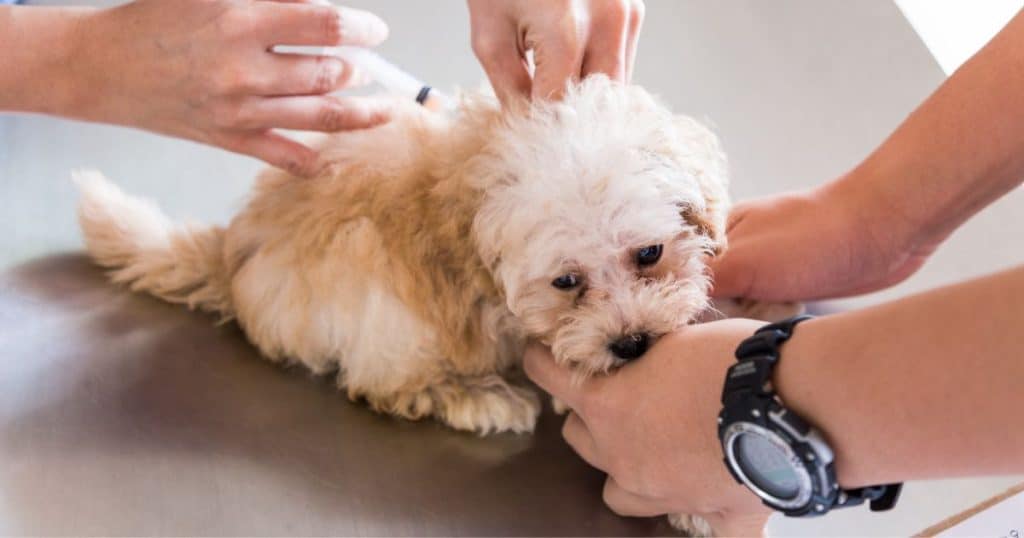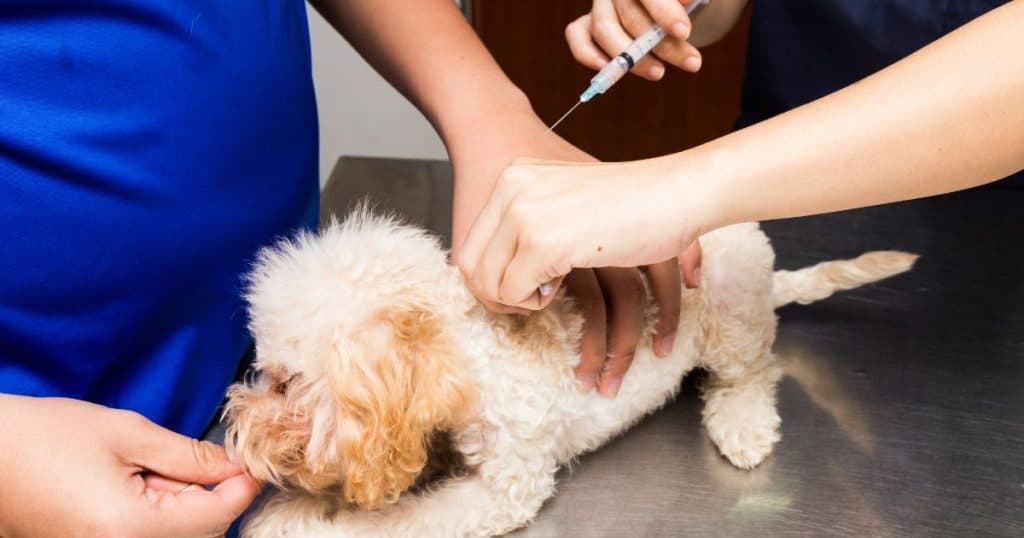What to Know
If you’re a poodle owner, it’s important to be aware of the potential health issues that your furry friend may face. One such condition is Poodle Sebaceous Adenitis, a rare and often misunderstood skin disorder. This condition can cause discomfort and even lead to hair loss in affected dogs, making it crucial to understand its causes, symptoms, and treatments.
Sebaceous Adenitis is a hereditary skin disease that affects the sebaceous glands, which are responsible for producing skin oils. When these glands become inflamed, they can lead to progressive hair loss and other skin-related issues. While it’s most commonly seen in Standard Poodles, it can also affect other breeds, including Akitas and Samoyeds. Understanding the symptoms and how to manage this condition can help ensure that your poodle remains healthy and happy.
Key Takeaways
- Poodle Sebaceous Adenitis is a rare skin disorder that can lead to hair loss and other skin-related issues.
- The condition affects the sebaceous glands, which produce skin oils and can become inflamed.
- While it’s most commonly seen in Standard Poodles, it can also affect other breeds, including Akitas and Samoyeds.
Understanding Poodle Sebaceous Adenitis

Poodle Sebaceous Adenitis (SA) is a hereditary skin disease that affects the sebaceous glands. These glands are responsible for producing sebum, which lubricates the skin and hair. In dogs with SA, the immune system attacks the sebaceous glands, causing inflammation and destruction. This can lead to hair loss, secondary skin infections, and other skin problems.
SA is most commonly seen in Standard Poodles, but it can also occur in other breeds and mixed breeds. It is an inflammatory disease that can lead to the destruction of the sebaceous glands, which can cause permanent hair loss and other skin issues.
The diagnosis of SA is typically made through a punch skin biopsy using local anesthesia (lidocaine). This allows the veterinarian to examine the sebaceous glands and determine if they are inflamed or damaged. Treatment for SA varies depending on the severity of the disease, but it typically involves managing the symptoms and using medications to reduce inflammation.
If you have a Poodle or another breed that is prone to SA, it is important to be aware of the signs and symptoms of the disease. These can include hair loss, dry or scaly skin, and skin infections. If you notice any of these symptoms in your dog, it is important to seek veterinary care right away.
In conclusion, Poodle Sebaceous Adenitis is a hereditary skin disease that affects the sebaceous glands. It can cause hair loss, skin infections, and other skin problems. If you suspect that your dog may have SA, it is important to seek veterinary care right away to ensure that your pet receives the appropriate treatment.
Symptoms of Sebaceous Adenitis

If you suspect that your Poodle may be suffering from Sebaceous Adenitis, there are several symptoms to look out for. This hereditary skin disease affects the sebaceous glands, leading to inflammation and hair loss. The disease is primarily seen in Standard Poodles, although there have been reported cases in a number of other breeds and mixed breeds as well.
One of the most common symptoms of Sebaceous Adenitis is patchy hair loss that gives a moth-eaten appearance. This hair loss can occur anywhere on the body but is most commonly seen on the head, ear flaps, and torso. The hair loss can be accompanied by mild skin scales, which can be a sign of scaling or hyperkeratosis.
Affected dogs may also develop scarring in the skin, which can lead to lesions that appear on the head, ears, and trunk. These lesions can be accompanied by itching, which can lead to pruritus. In some cases, bacterial infections can also occur along the hair follicle, which can cause a musty odor.
As the disease progresses, the hair follicles can become damaged, leading to hair that becomes dull, brittle, or matted. Casts can also form around the hair shaft, which can cause further damage to the hair follicles. In severe cases, the hair loss can progress to alopecia, which can cause complete hair loss in affected areas.
If you notice any of these symptoms in your Poodle, it is important to seek veterinary care as soon as possible. While there is no cure for Sebaceous Adenitis, early detection and treatment can help to manage the symptoms and slow the progression of the disease. Your veterinarian may recommend a variety of treatment options, including topical medications, antibiotics, and immunosuppressive drugs, depending on the severity of the disease.
Diagnosis and Clinical Signs

If you suspect that your Poodle may have Sebaceous Adenitis, it is important to have them evaluated by a veterinarian. A diagnosis of Sebaceous Adenitis is typically made based on the clinical signs and a skin biopsy.
The clinical signs of Sebaceous Adenitis in Poodles can vary in severity and presentation. The most common clinical signs include hair loss, scaling, and a dull or brittle hair coat. These clinical signs are often symmetrical and can be seen on the neck, back, and tail base. In severe cases, the entire body can be affected.
In addition to the clinical signs, a skin biopsy is often necessary to confirm the diagnosis of Sebaceous Adenitis. A skin biopsy involves removing a small piece of skin and examining it under a microscope. The biopsy can help to confirm the diagnosis and determine the severity of the disease.
It is important to note that other skin conditions can have similar clinical signs to Sebaceous Adenitis. Therefore, it is essential to have your Poodle evaluated by a veterinarian to ensure an accurate diagnosis.
If your Poodle is diagnosed with Sebaceous Adenitis, the treatment plan will depend on the severity of the disease. Treatment options may include topical or oral medications, such as antibiotics or immunosuppressive drugs. Regular bathing and grooming can also help to manage the clinical signs and improve the overall health of the skin and coat.
In summary, if you suspect that your Poodle may have Sebaceous Adenitis, it is essential to have them evaluated by a veterinarian. A diagnosis of Sebaceous Adenitis is typically made based on the clinical signs and a skin biopsy. Treatment options will depend on the severity of the disease and may include medications and regular grooming.
Genetic Factors and Breeds Affected

Poodle Sebaceous Adenitis is a genetic disease that affects the sebaceous glands of the skin. This disease is caused by an autoimmune reaction that targets the sebaceous glands, leading to inflammation and damage. While the exact cause of this disease is not yet known, studies have shown that it has a genetic basis.
The mode of inheritance of Sebaceous Adenitis is autosomal recessive. This means that the disease is only expressed when both parents carry the mutated gene. Therefore, breeders should screen their dogs for the disease before breeding to avoid passing on the mutated gene.
Several breeds are affected by Sebaceous Adenitis, including Poodles, Samoyeds, Akitas, Vizslas, and Havanese. However, Poodles are the most commonly affected breed. In fact, Sebaceous Adenitis is considered a breed-specific disease in Standard Poodles.
We earn a commission if you click this link and make a purchase at no additional cost to you.
Studies have shown that Sebaceous Adenitis has a strong genetic component in Poodles. Researchers have identified a specific gene mutation that is associated with the disease in Poodles. This mutation is located in the gene that codes for a protein called the plakophilin-1 (PKP-1). This protein is essential for the formation and maintenance of the skin barrier.
It is important to note that not all dogs that carry the mutated gene will develop Sebaceous Adenitis. Some dogs may be carriers of the gene without showing any symptoms of the disease. Therefore, it is important to screen breeding dogs for the disease to avoid passing on the mutated gene to their offspring.
In conclusion, Sebaceous Adenitis is a genetic disease that affects several breeds, including Poodles, Samoyeds, Akitas, Vizslas, and Havanese. The disease is caused by an autoimmune reaction that targets the sebaceous glands of the skin. Breeders should screen their dogs for the disease before breeding to avoid passing on the mutated gene. Studies have shown that Sebaceous Adenitis has a strong genetic component in Poodles, and a specific gene mutation has been identified in the breed.
Treatment and Management

When it comes to treating Poodle Sebaceous Adenitis, it is important to understand that there is no known cure for this condition. However, with proper management, it is possible to control the symptoms and improve the quality of life for your furry friend.
Treatment for Poodle Sebaceous Adenitis is aimed at managing the symptoms and preventing secondary skin infections. Your veterinarian may prescribe antibiotics to treat any bacterial infections that may arise. Topical therapies, such as shampoos, sprays, and mousses, can also be effective in reducing flaking, soothing the skin, and treating any associated bacterial infection.
Oral antibiotics may be required but may not be used initially to try to avoid the development of antibiotic resistance. Retinoids, such as Vitamin A, can also be helpful in managing the condition. Cyclosporine, an immune-mediated therapy, has also been shown to be effective in some cases.
To improve the texture of your dog’s coat, oil soaks can be used to maintain skin moisture, get rid of scaling, and leave the skin soft. A coat conditioner and hair emollient product can be mixed with water to form a soak. After the soak, the dog should be shampooed thoroughly.
It is important to note that Sebaceous Adenitis can lead to secondary bacterial and fungal skin infections. Therefore, it is important to manage the condition properly to prevent these infections from arising.
Overall, with proper treatment and management, it is possible to control the symptoms of Poodle Sebaceous Adenitis and improve the quality of life for your furry friend.
Other Affected Species

Sebaceous Adenitis is primarily seen in Standard Poodles, Akitas, and Samoyeds, although there have been reported cases in a number of other breeds and mixed breeds as well. However, it is an uncommon skin disease in cats, rabbits, horses, and humans.
According to a study published in the National Center for Biotechnology Information, sebaceous adenitis is rare in cats, rabbits, horses, and humans. The study also revealed that the disease was first described in three dogs by Scott in 1986. It is an inflammatory disease focusing on the sebaceous glands, eventually leading to their destruction.
In horses, sebaceous adenitis is a rare condition that affects the hair coat, causing hair loss and skin lesions. The condition is commonly seen in the Arabian horse breed. The lesions are usually seen on the neck, back, and rump.
In cats, sebaceous adenitis is a rare condition that affects the sebaceous glands of the skin. The condition is characterized by hair loss, scaling, and crusting of the skin. The lesions are usually seen on the neck, back, and tail.
In rabbits, sebaceous adenitis is a rare condition that affects the sebaceous glands of the skin. The condition is characterized by hair loss, scaling, and crusting of the skin. The lesions are usually seen on the neck, back, and tail.
In humans, sebaceous adenitis is a rare condition that affects the sebaceous glands of the skin. The condition is characterized by hair loss, scaling, and crusting of the skin. The lesions are usually seen on the scalp, face, and neck.
It is important to note that while sebaceous adenitis is rare in cats, rabbits, horses, and humans, it is still a serious condition that requires prompt veterinary attention. If you suspect your pet may be suffering from sebaceous adenitis, it is important to seek veterinary care as soon as possible.
Additional Considerations

If you suspect that your Poodle may have Sebaceous Adenitis (SA), it is important to take them to a veterinarian for a diagnosis. While SA is primarily seen in Standard Poodles, it can occur in other breeds as well. Additionally, it is possible for a dog to be subclinically affected by SA, meaning they show no visible symptoms, but still carry the genetic mutation for the disease.
It is important to note that SA is a hereditary disease, and breeding dogs with the condition can lead to an increased incidence of the disease in future generations. The Orthopedic Foundation for Animals (OFA) provides a registry for dogs that have been evaluated for SA, and it is recommended that breeders screen their dogs for the disease before breeding.
Treatment for SA typically involves managing symptoms, such as skin infections and hair loss, with medications and regular grooming. It is important to work with a veterinarian to develop a treatment plan that is tailored to your dog’s specific needs.
While the exact cause of SA is not fully understood, research suggests that it is a complex disease that may be caused by multiple genes or the interaction of genes and the environment. Further research is needed to fully understand the disease and develop more effective treatments.
In conclusion, if you suspect that your Poodle may have SA, it is important to seek veterinary care and work with a qualified professional to manage the disease. By taking steps to prevent the spread of the disease through responsible breeding practices, we can work towards reducing the incidence of SA in future generations of Poodles and other affected breeds.
FAQs
Can dogs die from sebaceous adenitis?
Sebaceous adenitis is a chronic skin disease that can cause hair loss and skin lesions in dogs. While it can be a serious condition, it is not typically fatal. With proper treatment and management, most dogs with sebaceous adenitis can live normal, happy lives.
What are the symptoms of sebaceous adenitis?
The symptoms of sebaceous adenitis can vary depending on the severity of the disease. Common signs include hair loss, scaling, crusting, and skin lesions. In some cases, the skin may become thickened and hyperpigmented. Sebaceous adenitis is most commonly seen in Standard Poodles, Akitas, and Samoyeds, although it can occur in other breeds as well.
Is sebaceous adenitis hereditary?
Yes, sebaceous adenitis is a hereditary condition that is passed down from parent dogs to their offspring. It is believed to be caused by a combination of genetic and environmental factors.
How do you treat sebaceous adenitis in dogs?
There is no cure for sebaceous adenitis, but the condition can be managed with proper treatment. Treatment typically involves a combination of medications, such as antibiotics and immunosuppressants, as well as regular grooming to remove scales and crusts. In some cases, surgery may be necessary to remove severely affected skin.
Is sebaceous adenitis painful for dogs?
Sebaceous adenitis is not typically a painful condition for dogs, although it can be uncomfortable and itchy. Dogs with severe skin lesions may experience some discomfort, but this can usually be managed with medication.
Is there a cure for sebaceous adenitis?
There is currently no cure for sebaceous adenitis, but the condition can be managed with proper treatment and care. With regular veterinary check-ups and ongoing management, most dogs with sebaceous adenitis can live happy, healthy lives.
These are some of the most frequently asked questions about sebaceous adenitis in dogs. If you suspect that your dog may be suffering from this condition, it is important to seek veterinary care as soon as possible. With proper treatment and management, most dogs with sebaceous adenitis can live normal, happy lives.


